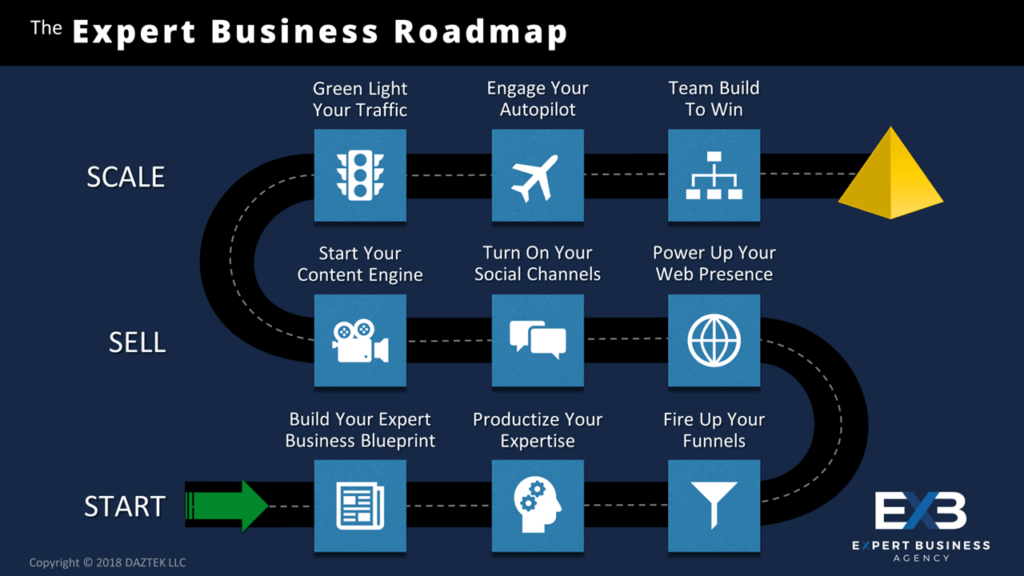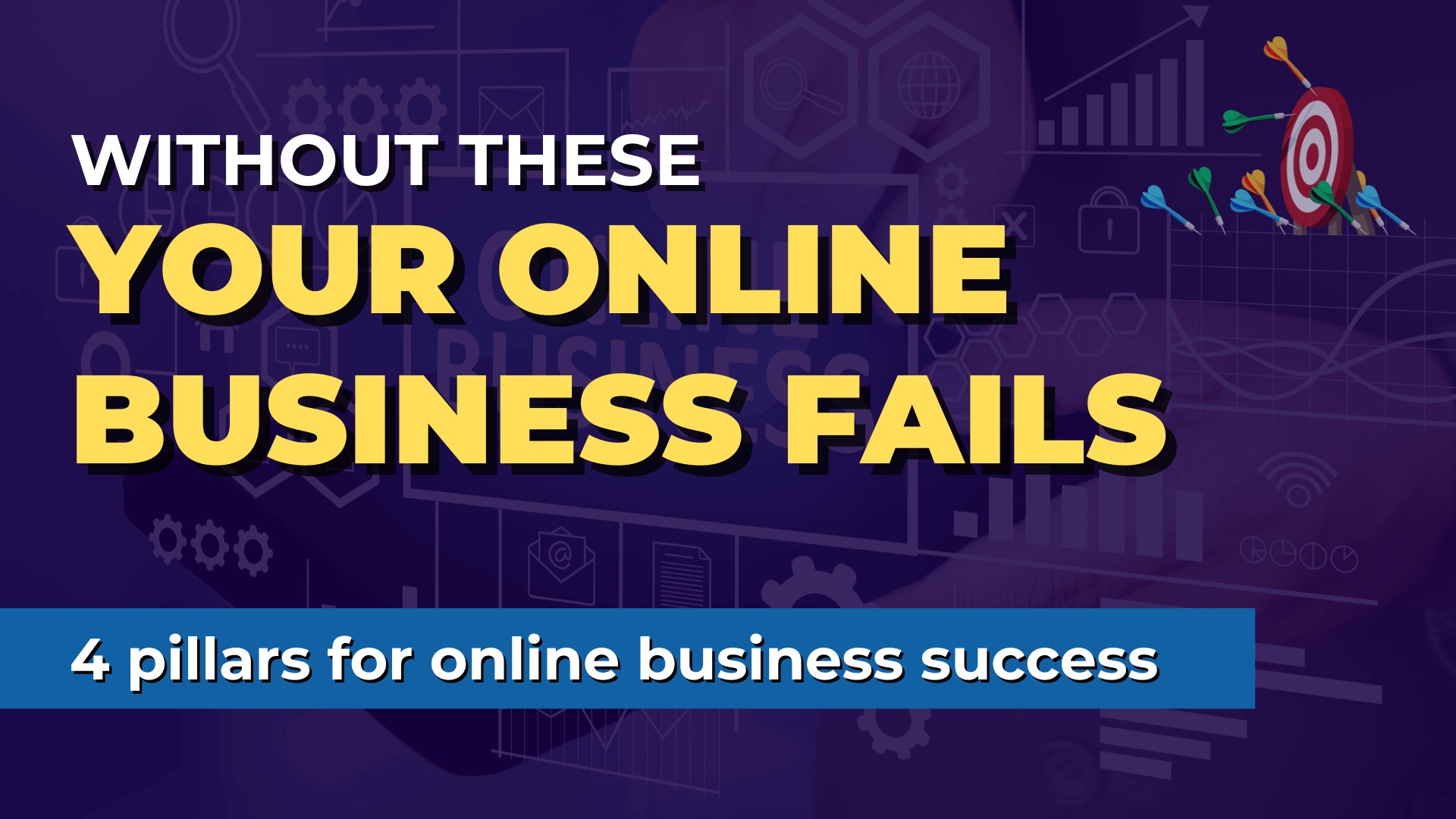Without these, your online business fails…
In this post you’ll learn the four foundation pillars of all successful online businesses.
If you’re missing one or more of these, your business is like a house with a weak foundation: it will tip over and fall.
The reason most coach, course, and membership creators fail to reach their goals is because they don’t have these pillars in place. They believe these pillars are things you put in place WHEN you are successful. In reality, these need to be put in place IN ORDER to be successful…
Without a Strategy, Tools, Systems, and Team Your Online Business Will Fail.
David Ziembicki
All online businesses need these four pillars for success:
- Strategy: Following a proven strategy and sticking with it until you are successful.
- Tools: The right tool for your specific business.
- Systems: The specific processes and procedures needed to build and run your specific business.
- Team: The people, vendors, and service providers that execute your strategy, tools, and systems.
Now you may be thinking “I’m just starting out and not ready for a team” or “I’m not making revenue so don’t have the budget for this”
Rest assured, there are free and low cost ways to start and scale over time.
Online Business Strategy
A well-defined strategy acts as the compass guiding your business towards success. It’s the blueprint that outlines your goals and describes how you plan to achieve them. Without it, your business is like a ship sailing without a map, susceptible to drifting off course or even capsizing.

Your strategy is a long-term plan that outlines who your customers are, what they value, and how you can deliver that value better than your competition. It’s about deciding what you want to achieve (your goals), understanding the landscape (your market and competition), and determining the best route to reach your destination (your tactics and operations).
Most importantly, you want to follow a strategy that is already proven to be successful.
Ryan Levesque, founder of the Ask Method, states this well when he says “Emulate before you Innovate”
Emulate before you innovate…
Ryan Levesque
What he means is, emulate or follow what is proven to be successful until you see success, THEN you can think about trying different things.
Online Business Tools
Choosing and using the right tools are essential for online business success. They are the first step in compounding your efficiency. The right tools help you start building an email list, sales funnels, and your online programs.
The right tools help you manage the projects and processes your business depends on. They help you start defining and building your business in terms of the systems required for success.

The right tools for you depend on your specific needs but the main idea is to choose the least amount of tools that address the most of your specific requirements. That means documenting your requirements and evaluating the options against them.
You determine your requirements by thinking of you business in terms of systems, the next pillar.
Online Business Systems
I’ve worked with and interviewed dozens and dozens of 6, 7, and even 8-figure online entrepreneurs and every single one of them that is successful has systemized their businesses and wished they had done so sooner.
What does that mean? It means defining your business in terms of the systems that need to be in place in order to guarantee success.
In this context, systems are topics like Project Management, Process Management, Content Creation, Marketing, etc.

A system is comprised of the processes and procedures required to achieve the goals of the system.
With Content Creation as an example, the goal is to generate and publish content at scale that brings organic traffic into your business.
What processes are required to achieve that goal? Examples include planning, creating, publishing, and promoting.
Within those processes, what standard operating procedures (SOPs) are required? Examples include creating and publishing a blog post. Creating and publishing a podcast episode.
Defining and documenting your systems, processes, and procedures are essential for efficiency and for the final pillar that accelerates your progress the most: establishing a team to delegate to.
Fractional Team
It seems counterintuitive, but even if you’re just starting and have no revenue, establishing a team is absolutely essential to your success.
Most solopreneurs, coaches, and course creators believe they need to bootstrap and do everything themselves until they are successful and then they’ll hire help.
But there’s far too much to do and too many skills required for any one person to deliver. This is why so many burn out and fail.

Instead, success requires you to begin delegating NOW.
Success requires you to begin delegating NOW.
David Ziembicki
Establishing a team, even if it’s just a virtual assistant or a part-time fractional team enables work to be delegated, which in turn enables you to accomplish more in your business more quickly. Imagine launching your program in 3 months instead of 12.
A part-time fractional team is the best option, especially if you are just starting or in your first year or two of business and may not need or have the budget for full-time employees.
A fractional team means a set of people and service providers that cover topics such as tech, design, editing, marketing, etc.
Fractional teams are far better than relying on a single virtual assistant as they offer specialized skills on an as-needed basis, providing flexibility while also bringing expertise to your business.
TAKE ACTION
To put this in action, you need to follow a proven strategy, put in place the right tools, design your business in terms of the systems required for success, then establish a team and delegate the execution to them.
For a full breakdown of how to do this, check out the Expert Business System (free)

David Ziembicki
David Ziembicki is the founder and CEO of the Expert Business Agency, which helps coaches, course, and membership creators build their online businesses. David has been an industry-leading technology and business consultant for over 25 years having worked at Microsoft, Deloitte, SAIC, and Avanade.

